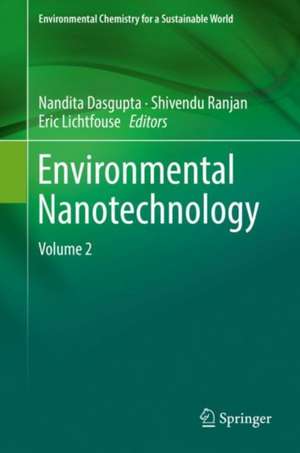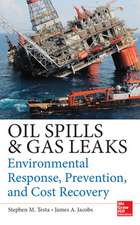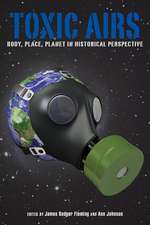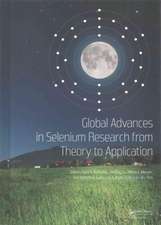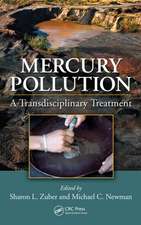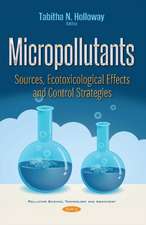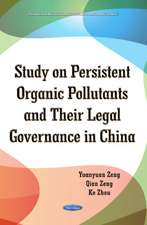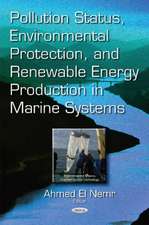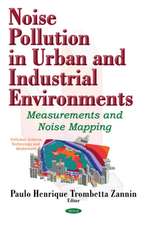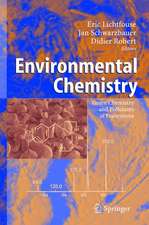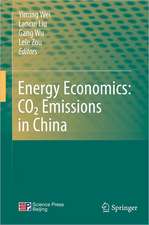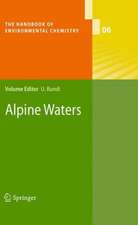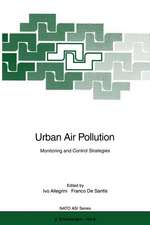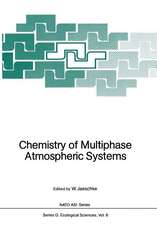Environmental Nanotechnology: Volume 2: Environmental Chemistry for a Sustainable World, cartea 21
Editat de Nandita Dasgupta, Shivendu Ranjan, Eric Lichtfouseen Limba Engleză Hardback – 5 dec 2018
The reader will also find presentations on molecularly imprinted polymeric nanocomposites, critical and comparative comments on Nano-biosensors and Nano-aptasensors and on applications of nanotechnology for the remediation and purification of water with a main focus on drinking water. The last chapter presents a comprehensive review on plasmonic nanoparticle based sensors whereby the authors have hypothesized the future applications in the environment which can be plausible in the near future.
| Toate formatele și edițiile | Preț | Express |
|---|---|---|
| Paperback (1) | 850.45 lei 38-44 zile | |
| Springer International Publishing – 19 dec 2018 | 850.45 lei 38-44 zile | |
| Hardback (2) | 648.24 lei 3-5 săpt. | |
| Springer International Publishing – 5 dec 2018 | 648.24 lei 3-5 săpt. | |
| Springer International Publishing – 6 iun 2018 | 866.23 lei 38-44 zile |
Din seria Environmental Chemistry for a Sustainable World
- 18%
 Preț: 1118.45 lei
Preț: 1118.45 lei - 15%
 Preț: 645.79 lei
Preț: 645.79 lei - 15%
 Preț: 653.14 lei
Preț: 653.14 lei - 15%
 Preț: 643.34 lei
Preț: 643.34 lei - 15%
 Preț: 651.51 lei
Preț: 651.51 lei - 15%
 Preț: 646.62 lei
Preț: 646.62 lei - 18%
 Preț: 956.81 lei
Preț: 956.81 lei - 18%
 Preț: 959.98 lei
Preț: 959.98 lei - 15%
 Preț: 646.62 lei
Preț: 646.62 lei - 18%
 Preț: 1389.30 lei
Preț: 1389.30 lei - 18%
 Preț: 1229.10 lei
Preț: 1229.10 lei - 18%
 Preț: 1001.81 lei
Preț: 1001.81 lei - 18%
 Preț: 1118.62 lei
Preț: 1118.62 lei - 18%
 Preț: 899.21 lei
Preț: 899.21 lei - 18%
 Preț: 1120.18 lei
Preț: 1120.18 lei - 18%
 Preț: 896.08 lei
Preț: 896.08 lei - 18%
 Preț: 788.72 lei
Preț: 788.72 lei - 18%
 Preț: 1009.70 lei
Preț: 1009.70 lei - 15%
 Preț: 650.86 lei
Preț: 650.86 lei - 15%
 Preț: 646.62 lei
Preț: 646.62 lei - 18%
 Preț: 1017.62 lei
Preț: 1017.62 lei - 18%
 Preț: 1118.62 lei
Preț: 1118.62 lei - 15%
 Preț: 644.95 lei
Preț: 644.95 lei - 5%
 Preț: 915.58 lei
Preț: 915.58 lei - 24%
 Preț: 751.40 lei
Preț: 751.40 lei - 18%
 Preț: 1008.12 lei
Preț: 1008.12 lei - 18%
 Preț: 1113.89 lei
Preț: 1113.89 lei - 18%
 Preț: 950.52 lei
Preț: 950.52 lei - 18%
 Preț: 959.98 lei
Preț: 959.98 lei - 15%
 Preț: 648.42 lei
Preț: 648.42 lei - 18%
 Preț: 950.96 lei
Preț: 950.96 lei - 23%
 Preț: 852.88 lei
Preț: 852.88 lei - 18%
 Preț: 959.50 lei
Preț: 959.50 lei - 20%
 Preț: 647.13 lei
Preț: 647.13 lei - 24%
 Preț: 744.58 lei
Preț: 744.58 lei - 18%
 Preț: 1215.22 lei
Preț: 1215.22 lei - 20%
 Preț: 570.17 lei
Preț: 570.17 lei - 24%
 Preț: 824.15 lei
Preț: 824.15 lei - 15%
 Preț: 647.59 lei
Preț: 647.59 lei
Preț: 648.24 lei
Preț vechi: 762.64 lei
-15% Nou
Puncte Express: 972
Preț estimativ în valută:
124.03€ • 129.52$ • 102.43£
124.03€ • 129.52$ • 102.43£
Carte disponibilă
Livrare economică 26 martie-09 aprilie
Preluare comenzi: 021 569.72.76
Specificații
ISBN-13: 9783319987071
ISBN-10: 3319987070
Pagini: 294
Ilustrații: XIII, 290 p. 83 illus., 66 illus. in color.
Dimensiuni: 155 x 235 x 21 mm
Greutate: 0.64 kg
Ediția:1st ed. 2019
Editura: Springer International Publishing
Colecția Springer
Seria Environmental Chemistry for a Sustainable World
Locul publicării:Cham, Switzerland
ISBN-10: 3319987070
Pagini: 294
Ilustrații: XIII, 290 p. 83 illus., 66 illus. in color.
Dimensiuni: 155 x 235 x 21 mm
Greutate: 0.64 kg
Ediția:1st ed. 2019
Editura: Springer International Publishing
Colecția Springer
Seria Environmental Chemistry for a Sustainable World
Locul publicării:Cham, Switzerland
Cuprins
1. Biomolecules assisted synthesis of metal nanoparticles.- 2. Resistive and Capacitive Measurement of Nano-Structured Gas Sensors.- 3. Nanotechnology based delivery of nutraceutical.- 4. Health benefits and potential risks of nanostructured materials.- 5. Molecularly imprinted polymeric nanomaterials for environmental analysis.- 6. Nano-biosensors and Nano-aptasensors for Stimulant Detection.- 7. Nanotechnology for water remediation.- 8. Polymers-Metal Nanoparticles.- 9. Nanomaterials and plant abiotic stress in agroecosystems.- 10. Nanosensors for environmental analysis based on plasmonic nanoparticles.
Textul de pe ultima copertă
This is the second volume on Environmental Nanotechnology. The first chapter discusses the synthesis of nanomaterial and mainly the green synthesis of inorganic nanomaterials. Furthermore, a comperative discussion about resistive and capacitive measurement of nano-based biosensor is reviewed and the efficient delivery of nutraceutical with the help of nano-vehicles are explained. Moreover, the book also includes reviews on such topics as nanopharmaceuticals, health benefits and the toxic impact of heavy metal nanomaterials and the impact of several nanomaterials on plant abiotic stress and have focussed on the long term impacts of nanomaterials on agroecosystems.
The reader will also find presentations on molecularly imprinted polymeric nanocomposites, critical and comparative comments on Nano-biosensors and Nano-aptasensors and on applications of nanotechnology for the remediation and purification of water with a main focus on drinking water. The last chapter presents a comprehensive review on plasmonic nanoparticle based sensors whereby the authors have hypothesized the future applications in the environment which can be plausible in the near future.
Caracteristici
Features environmental benefits of nanomaterials in water purification, nanomedicine, agriculture and environment Looks at nanobiosensors and nanotoxicology Features topics such as nanotechnology prospects and constraints in agriculture, nano-food technology and nutrition, and more
